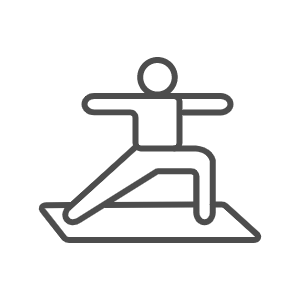
NEW In!
PURE-Matte Light TaupeShopping cart
Your shopping basket is empty
Free shipping from €39
Produced Ecologically & Fair
For All Yoga Styles
Yoga

Meditation
Sets & Bundles
Why are you meditating? Why should you meditate? What brings meditation? One of the most common answers to this question is: to relieve stress. We all know the feeling of being "stressed" and having a lot on our minds. But what actually is stress?

An important part of our nervous system is the autonomic or involuntary nervous system . We cannot control this at will. It is responsible for all internal body processes, such as digestion or various metabolic processes. The autonomic nervous system is divided into two different parts: the sympathetic and the parasympathetic.
Sympathetic and parasympathetic are to be understood as opponents who ensure that the body is able to adapt to external and internal stimuli and to be able to react to them appropriately. The sympathetic part of the autonomic nervous system ensures increased alertness as well as physical and mental tension. It triggers the so-called stress response.
First of all, stress is nothing more than a mechanism for the body, mind and soul to adapt to the given circumstances and to be able to react accordingly quickly. In the past, the triggers for this reaction were sources of danger such as wild animals. Today, the trigger can also be the yelling boss or the to-do list that is too full. No matter what the trigger, the biochemical and psychological response is always the same.
In order to be able to counter the potential danger as well as possible, the stress reaction is a complex chain reaction of various metabolic processes that affect the whole body.
A stress reaction always occurs in phases. In the first phase, the preliminary phase or stimulus phase , people perceive a certain stimulus. This can be internal, external or a combination of both components. The stimulus is then evaluated. If this is categorized as "stress", the stress response begins to take effect.
It is important to understand that almost all stimuli are initially neutral and only the individual evaluation makes them a stress trigger. What blows all the fuses for one person may leave the other completely cold. Once the stress response is activated, it continues to run its course, no matter how big or small the trigger may be.
In the second phase, the alarm phase , the entire body is put on standby. The adrenal glands, which are responsible for the release of adrenaline and cortisol, are finally activated via various points in the brain (eg amygdala and hypothalamus) and other intermediate points. These activate other messengers in the body and cause a wide variety of reactions in the body. Sugar is released into the blood and thus provides important energy for the entire body. The adrenaline causes an increase in blood pressure and a faster heartbeat. The pupils dilate. The large muscles are better supplied with blood and in general the muscles tense more. Digestion is inhibited and the genitals are less supplied with blood.
This phase is called the action phase because the human body is now fully ready to react ("fight") or "flee". This phase of action is not always completely carried out today due to our type of stressors. After all, who really tells their boss what they think or frees themselves from too many tasks?
This non-reaction is problematic because it keeps us on constant alert. The body is ready, but a corresponding action that would lead to the reduction of stress hormones is missing. Ideally, after a short-term stressful situation with a corresponding reaction, we relax again and everything returns to a relaxed state. The antagonist of the sympathetic nervous system, the parasympathetic nervous system, sees to it. This nerve will referred to as the relaxation nerve and ensures the recovery phase .
It is often forgotten that the recovery phase must be an important part of the stress response in order to remain healthy and balanced in the long term.

The parasympathetic nervous system takes care of the regeneration of the body and builds up energy reserves again. The heart begins to beat slowly again, the blood vessels dilate, the muscles relax. The parasympathetic supports the enteric nervous system in the digestive processes and ensures secretion of the digestive secretions. The released stress hormones are reduced.
With our current lifestyle and in our society, we tend to find ourselves in the state of the activated sympathetic nervous system, i.e. under constant stress. If the balance with the effects of the parasympathetic is no longer established, this can have long-term consequences for the body.
Chronic stress is the result of long-term stressors or stressors that recur at very short intervals. The stress reaction is therefore almost continuous and the body is always on the alert. It makes no difference whether the stressor is present as a real threat, a stressful situation or internally as a disturbing thought pattern. The body does not differentiate and throws the same reaction over and over again.
Stress is something highly individual and everyone reacts to a different stimulus. It is important to understand that the stimulus per se is not the trigger for stress, it is our own evaluation that makes it a stressor can classify. Through a regular meditation practice , we learn to deal better with our personal stressors and to perceive them more and more as a simple stimulus instead of immediately going on the alert.
Meditation helps you observe situations neutrally rather than reacting violently to them immediately. As a result, a stress reaction does not occur so quickly. If the stress reaction is triggered, which is only natural and human, your meditation practice can help you to start the last phase, the recovery phase, much faster. So you don't get stuck in a permanent loop of being on the alert, but activate the counterpart, your parasympathetic nervous system, faster and more efficiently. The regeneration phase is more effective and is not interrupted as quickly by new stressors.
In addition, meditation helps you to develop a better body awareness and more awareness of your own self. Many stressful situations and reactions often take place subconsciously. Through a deeper understanding of yourself and through self-compassion , you learn to listen to yourself better and to develop what is really good for you.

According to Patanjali, the goal of yoga practice is to still the undulations of the mind. One of the most important tools on the way there is our ...
Continue reading
As a yoga teacher, how often have I heard: “I would also like to do yoga, but I can’t even get my fingers up to my toes!” or “Unfortunately I’m too...
Continue reading